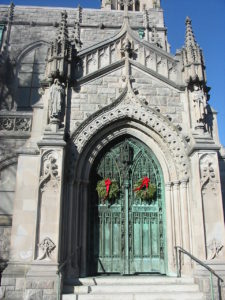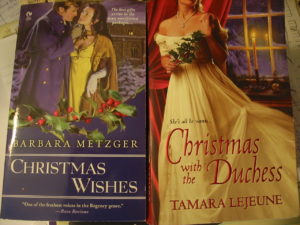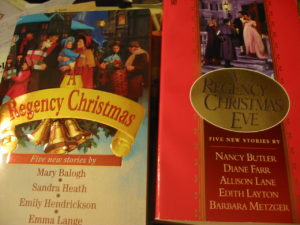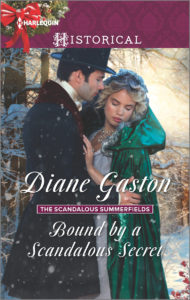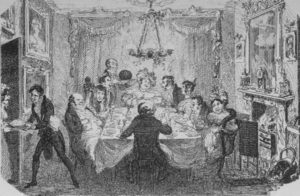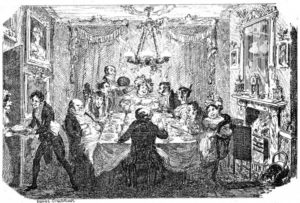 How do you celebrate the January holidays? I think I have only just recovered from celebrating New Year’s Eve, when I hosted a group of old friends who gather to enjoy a festive dinner every year. My health has improved tremendously (9 months of physical therapy has helped a lot) but my stamina is still not what it was. And yet, tomorrow I am heading off to an all-day celebration of Twelfth Night (including a feast) in a beautiful Gothic church hall in Fairhaven, MA. I LOVE this event and am so pleased I’m well enough to go this year! I fully endorse the idea of twelve days in the Christmas season.
How do you celebrate the January holidays? I think I have only just recovered from celebrating New Year’s Eve, when I hosted a group of old friends who gather to enjoy a festive dinner every year. My health has improved tremendously (9 months of physical therapy has helped a lot) but my stamina is still not what it was. And yet, tomorrow I am heading off to an all-day celebration of Twelfth Night (including a feast) in a beautiful Gothic church hall in Fairhaven, MA. I LOVE this event and am so pleased I’m well enough to go this year! I fully endorse the idea of twelve days in the Christmas season.
The characters in my new release, LORD OF MISRULE, celebrate both of these holidays in the course of the story, which begins on Christmas Eve day and ends on Twelfth Night (not counting the epilogue). On New Year’s Eve, they are traveling, so they celebrate with other strangers in the public room of an inn. On Twelfth Night they are back in the little village of Little Macclow, and they –well, I recommend you read the book, LOL.
We know that many of the old traditions surrounding Christmas and these January holidays had been forbidden by the Puritans in the mid-17th century. Celebrating Christmas in any form was actually illegal. (No doubt some families continued to celebrate secretly.) However, once the Puritans fell from power, it took time and an actual campaign by one man determined to see the customs revived to bring them back into fashion by the early 18th century. The revival faded a bit (too “old-fashioned” by Regency times) but was then not only revived again but expanded in the Victorian times, when new customs were added from the German traditions. 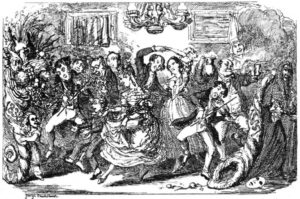 But I only recently discovered how the revival really came to pass. While researching for LORD OF MISRULE I stumbled across a most excellent blogpost from 2009 on the Austenonly.com website, which addresses the misconception some people have that all the old customs weren’t being observed during the Regency. The article “But Surely Christmas in England didn’t exist until Dickens invented it?” talks about the role played by writer William [or Robert] Wynstanley, who through his annual publication of Poor Robin’s Almanac over a period of thirty-eight years [1663-1701] promoted the revival of Christmas traditions. How’s that for perseverance?
But I only recently discovered how the revival really came to pass. While researching for LORD OF MISRULE I stumbled across a most excellent blogpost from 2009 on the Austenonly.com website, which addresses the misconception some people have that all the old customs weren’t being observed during the Regency. The article “But Surely Christmas in England didn’t exist until Dickens invented it?” talks about the role played by writer William [or Robert] Wynstanley, who through his annual publication of Poor Robin’s Almanac over a period of thirty-eight years [1663-1701] promoted the revival of Christmas traditions. How’s that for perseverance?
Later, a version under the same name was published by Ben 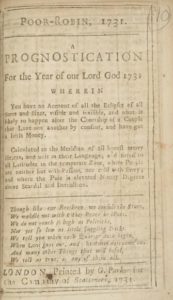 Franklin’s brother and served as the model for his more famous Poor Richard’s Almanac. I see confusion between the different versions and end-dates that don’t pay attention to where these almanacs were published. (the researcher’s headache.) The publication continued to be issued by others (including possibly Robert Herrick whose name is also associated with it) as late as (pick one!) 1776? 1828?
Franklin’s brother and served as the model for his more famous Poor Richard’s Almanac. I see confusion between the different versions and end-dates that don’t pay attention to where these almanacs were published. (the researcher’s headache.) The publication continued to be issued by others (including possibly Robert Herrick whose name is also associated with it) as late as (pick one!) 1776? 1828?
From the 1664 edition:
“Provide for Christmas ere that it do come
To feast thy neighbour good cheer to have some;
Good bread and drink, a fire in the hall,
Brawn, pudding, souse and good mustard withal;
beef, mutton, pork, and shred pies of the best,
Pig, veal, goose, capon, and turkey well drest;
Apples and nuts to throw about the hall,
That boys and girls may scramble for them all.
Sing jolly carols, make the fiddlers play,
Let scrupulous fanatics keep away;
For oftentimes seen no arranter knave
Than some who do counterfeit most to be grave.”
I hope you have enjoyed a wonderful holiday season shared with people you love! We here at the Riskies wish you all the very best in 2019, and we thank you for following our humble efforts here. Do you have any special holiday traditions for New Year’s or Twelfth Night? We would love to hear about them.


